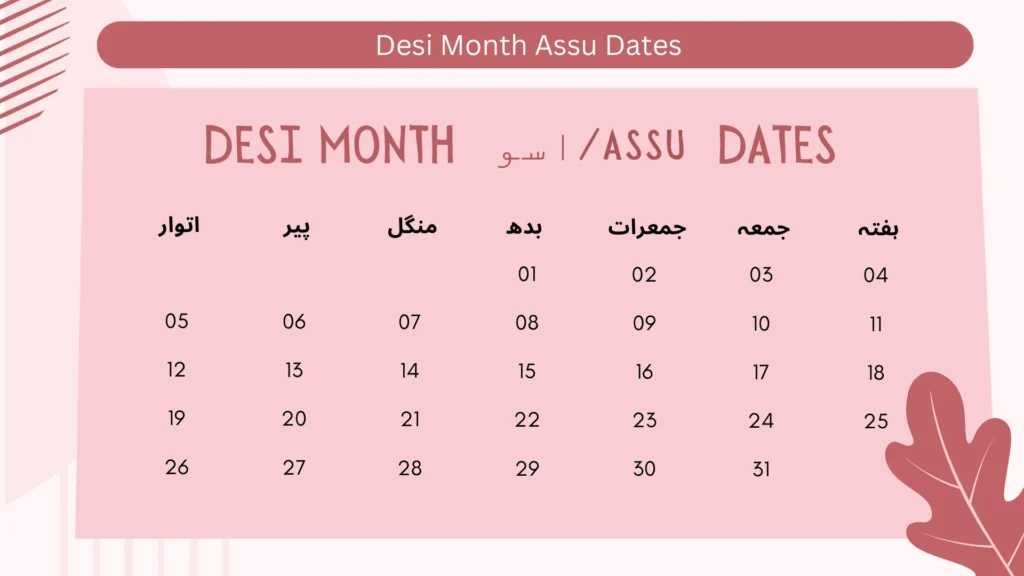Desi Month Assu Dates 2024 Aligned with English (Gregorian) Dates
Finding the dates for the Desi month Assu in 2024 matched with the English calendar is straightforward. This information helps you track important cultural, religious, and personal dates. The Assu dates are displayed in both Desi and English formats and you can even check today’s Desi month date, Sangrand, and Gurpurabs. Additionally, discover other Desi month dates for 2024: Chet, Vaisakhi, Jeth, Harh, Sawan, Badhon, Katak, Maghar, Poh, Magh, and Phagun.
Understanding the Desi Calendar and the Desi Month Assu

The Desi calendar, also known as the Punjabi calendar, is essential in the agricultural and cultural life of the Indian subcontinent. Desi month Assu, also called Ashwin, is the seventh month of this calendar and falls from September 15th to October 14th in the Gregorian calendar. This month is noted for its changing weather, important agricultural activities, and various festivals celebrated by Muslims, Sikhs, and Hindus.
Calendars and Desi Month Assu
- Desi Calendar (Punjabi Calendar): Desi month Assu marks the end of the monsoon and the beginning of autumn. It’s a critical time for preparing and harvesting certain crops.
- Nanakshahi Calendar: Created by the Shiromani Gurdwara Parbandhak Committee (SGPC) in 2003, this modern calendar also places Assu from September 15th to October 14th. It includes many Sikh religious events.
- Bikrami Calendar: This ancient lunar-solar calendar used in India and Nepal also recognizes Assu as a significant month of traditional Hindu festivals.
Weather During Desi Month Assu
- Rainfall: Monsoon rains decrease, with only occasional showers.
- Temperature: Ranges from 20°C (68°F) to 30°C (86°F), becoming more relaxed as the month goes on.
- Humidity: Drops significantly, making the weather more comfortable.
- Agricultural Activities: Crucial for preparing fields for the Rabi cropping season.
Festivals and Cultural Significance During Desi Month Assu
Desi month Assu is rich in cultural celebrations:
- Muslim Festivals:
- Milad-un-Nabi: Celebrates the birth of Prophet Muhammad with prayers, sermons, and processions.
- Sikh Festivals:
- Bandi Chhor Divas: Celebrate the release of Guru Hargobind Sahib Ji with prayers and fireworks.
- Joti Jot of Guru Ram Das Ji: Observe Guru Ram Das Ji’s death anniversary with prayers and community meals.
- Hindu Festivals:
- Navratri: Nine nights dedicated to Goddess Durga with fasting, prayers, and dancing.
- Dussehra: Marks Lord Rama’s victory over Ravana with effigy burning and performances.
- Karva Chauth: Married women fast from sunrise to moonrise for their husband’s well-being.
Agricultural Importance of Desi Month Assu
Traditional Practices and Rituals
Conclusion
The Desi month of Assu, from September 15th to October 14th, is culturally, religiously, and agriculturally significant. It marks the transition from the monsoon season to autumn, with moderate temperatures and reduced humidity creating ideal conditions for farming activities. Festivals celebrated during Assu reflect the region’s rich cultural diversity and traditional practices, highlighting the deep connection between nature, agriculture, and religion. Understanding Assu’s significance helps us appreciate the harmony between natural cycles and cultural practices that have sustained communities for centuries.
